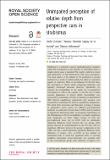Unimpaired perception of relative depth from perspective cues in strabismus
Abstract
Strabismus is a relatively common ophthalmological condition where the coordination of eye muscles to binocularly fixate a single point in space is impaired. This leads to deficits in vision and particularly in three-dimensional (3D) space perception. The exact nature of the deficits in 3D perception is poorly understood as much of understanding has relied on anecdotal reports or conjecture. Here, we investigated, for the first time, the perception of relative depth comparing strabismic and typically developed binocular observers. Specifically, we assessed the susceptibility to the depth cue of perspective convergence as well as the capacity to use this cue to make accurate judgements of relative depth. Susceptibility was measured by examining a 3D bias in making two-dimensional (2D) interval equidistance judgements and accuracy was measured by examining 3D interval equidistance judgements. We tested both monocular and binocular viewing of images of perspective scenes under two different psychophysical methods: two-alternative forced-choice (2AFC) and the method of adjustment. The biasing effect of perspective information on the 2D judgements (3D cue susceptibility) was highly significant and comparable for both subject groups in both the psychophysical tasks (all ps < 0.001) with no statistically significant difference found between the two groups. Both groups showed an underestimation in the 3D task with no significant difference between the group's judgements in the 2AFC task, but a small statistically significant difference (ratio difference of approx. 10%, p = 0.016) in the method of adjustment task. A small but significant effect of viewing condition (monocular versus binocular) was revealed only in the non-strabismic group (ratio difference of approx. 6%, p = 0.002). Our results show that both the automatic susceptibility to, and accuracy in the use of, the perspective convergence cue in strabismus is largely comparable to that found in typically developed binocular vision, and have implications on the nature of the encoding of depth in the human visual system.
Citation
Zlatkute , G , Sagnay de la Bastida , V C & Vishwanath , D 2020 , ' Unimpaired perception of relative depth from perspective cues in strabismus ' , Royal Society Open Science , vol. 7 , no. 12 , 200955 . https://doi.org/10.1098/rsos.200955
Publication
Royal Society Open Science
Status
Peer reviewed
ISSN
2054-5703Type
Journal article
Description
This work was supported by the Engineering and Physical Sciences Research Council (grant no. EP/M506631/1). It was part of the grant submitted by D.V., which covered PhD scholarship for G.Z.Collections
Items in the St Andrews Research Repository are protected by copyright, with all rights reserved, unless otherwise indicated.

